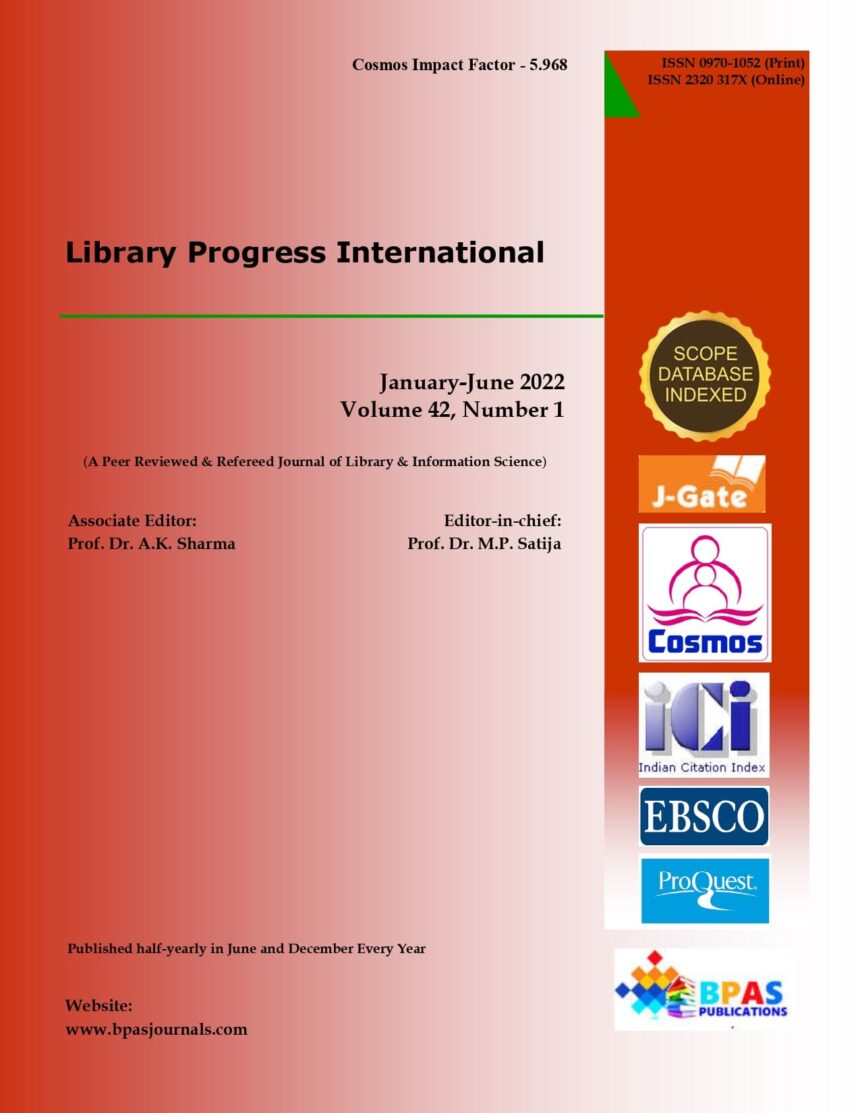Users’ Expectation of Library Services and Resources in the COVID 19 Pandemic Era: A Comparative Study of Two Academic Libraries in Nigeria
DOI:
https://doi.org/10.48165/Keywords:
User Expectation, Library Service, Library Resources, COVID-19, Pandemic Era, Academic Libraries, NigeriaAbstract
The study was carried out to examine users’ expectation of library services and resources in this COVID-19 pandemic era. The descriptive survey design was adopted for the study. The population of the study comprises library users of College of Education Library, Agbor and Federal University of Petroleum Resources Library, Effurun, Delta State. 210 respondents were selected each from the two academic libraries via purposive sampling technique making a total of 420 respondents used for the study. The instrument used for data collection was an online questionnaire designed through Survey Monkey. The study revealed that the respondents from both academic libraries indicated they expect services such as electronic access to services and resources, virtual reference services, accurate COVID-19 information to keep them updated, online user education programmes, selective dissemination of information via email, display of library services on social media, research help services online, and a spacious study hall to enable them observe the physical distancing while studying in the library. Also, users from both academic libraries indicated they expect to have access to electronic databases, e-zines and online newspapers, internet sources, e-journals, e-books and government publication in this COVID-19 pandemic era. On the channels of accessing services and resources in this COVID-19 pandemic period revealed that the respondents from both academic libraries agreed that they access library services and resources majorly through Email Service, while only respondents from College of Education, Agbor indicated that the also access their academic library services and resources through their library social media platforms. It can be observed also from the study that the respondents from both academic libraries were averagely satisfied with their academic library though they expect more incorporation of information communication technology in service delivery to boost their access in this COVID-19 pandemic era.
Downloads
References
Adam, R. (2017). Assessment of library service quality and user satisfaction among undergraduate students of Yusuf Maitama Sule University (YMSU) Library. Library Philosophy and Practice (e journal). Paper 1675. Retrieved from https://digitalcommons.unl.edu/libphilprac/1675
Anyaoku, E.N., Osuigwe, N.E., & Oguaka, C.N. (2014). The knowledge society, libraries and users’ expectations on information service delivery: Any paradigm shift? Library and Information Science Digest, 7, 101-111.
Babalhavaej, F., Isfandyaari-Moghaddam, A., Aqili, S.V., Shakooii, A. (2009). Quality assessment of academic library performance: The case of an Iranian academic library. Malaysian Journal of Library & Information Science, 14(2), 51-81.
Bhattacharjee, S., Bhattacharjee, S., & Sinha, M.K. (2016). User perception and expectation from university libraries: A case study among student community at Tripura. Retrieved from http://ir.inflibnet.ac.in:8080/ir/ViewerJS/#../bitstream/1944/2044/1/40.pdf
Brophy, J., & Bawden, D. (2005). Is Google enough? Comparison of an internet search enginewith academic library resources. Aslib Proceedings, 57(6), 498-512.
Cox, C. (2020). Changed, Changed Utterly. Retrieved from
https://www.insidehighered.com/views/2020/06/05/academic-libraries-will-change significant-ways-result-pandemic-opinion
Fast, K.V., &Campbell, D.G. (2004). I still like Google: University student perceptions of searching OPACs and the Web”, Proceedings of the 67th ASIS&T Annual Meeting 8. Griffiths, J.R., & Brophy, P. (2005). Student searching behaviour and the web: use of academic resources and Google. Library Trends, 53(4), 539-554.
Ijiekhuamhen, O. P., Aghojare, B., & Ferdinand, O. A. (2015). Assess users’ satisfaction on academic library performance: A Study. International Journal of Academic Research and Reflection, 3(5), 67-77.
Ijiekhuamhen, O.P., & Oyovwe-Tinuoye, G.O. (2020). User’s perception of services, resources and facilities in Federal University of Petroleum Resources Effurun (FUPRE) Library. Library Philosophy and Practice (e-journal). Paper 3654. Retrieved from
https://digitalcommons.unl.edu/libphilprac/3654/
Karim, N.S.A., Darus, S.H., & Hussein, R. (2006). Mobile phone applications in academic library services: A students' feedback survey. Campus-Wide Information Systems, 23(1), 35-51. 12. Kaur, H., & Sharda, P. (2010). Role of technological innovations in improving library services. International Journal of Library and Information Science, 2(1), 011-016.
Kim, S. (2018). Analyzing Organizational Schemes of Information Resources in Library Websites by User Education Approaches. Retrieved from
https://asistdl.onlinelibrary.wiley.com/doi/pdf/10.1002/meet.14504301188 14. Kumar, D., Malviya, R., & Sharma, P.K. (2020). Corona Virus: A Review of COVID-19. Eurasian Journal of Medicine and Oncology, 4(1), 8-25.
Liu, Y., Kuo, R., & Shih, S. (2020). COVID-19: The first documented coronavirus pandemic in history. Elsevier Public Health Emergency Collection. Retrieved from
https://www.ncbi.nlm.nih.gov/pmc/articles/PMC7199674/
Mierzecka, A., Kisilowska, M., & Suminas, A. (2017). Researchers’ expectations regarding the online presence of academic libraries. College and Research Libraries, 78(7).
https://crl.acrl.org/index.php/crl/article/view/16789/18348
Novotny, E. (2004). I don’t think I click: a protocol analysis study of a library online catalog in the internet age. College and Research Libraries, 65(6), 525-537.
Odu, J.O., & Omini, E.U. (2018). Mobile phone applications and the utilisation of library services in the University of Calabar Library Nigeria. Global Journal of Educational Research, 16, 111-119.
Ogbebor, O. (2011). Library resources and their role in education. Retrieved from https://osarome.blogspot.com/2011/10/library-resources-and-their-role-in.html 20. Owusu-Ansah, S., & Babuama, C.K. (2015). Accessing academic library services by distance learners. Library Philosophy and Practice. Paper 1347. Retrieved from
http://digitalcommons.unl.edu/libphilprac/1347
Saleh, A.G. (2014). Meeting the information needs of remote library users: The case of university of Maiduguri distance learning programme. Information Impact: Journal of Information and Knowledge Management, 5(2), 1-16.
SeAMK University of Applied Sciences Library. (2020). Access to e-resources anywhere & anytime. Retrieved from https://seamk.libguides.com/eresources/mobileaccess 23. Simmonds, P.L., & Andaleeb, S.S. (2001). Usage of academic libraries: The role of servicequality, resources, and user characteristics. Retrieved from
https://www.ideals.illinois.edu/bitstream/handle/2142/8368/librarytrendsv49i4f_opt.pdf 24. Singh, S. (2017). Academic library services. Retrieved from
http://epgp.inflibnet.ac.in/epgpdata/uploads/epgp_content/library_and_information_scie nce/academic_libraries/17._academic_library_services/et/4440_et_17.pdf
Swapna, S.C., Jagdish, S.J., & Manjula, P. (2017). Library user’s perceptions and expectations towards Mysore university library: A case study. International Journal of Library and Information Studies, 7(4), 351-357.
Wenborn, C. (2018). How technology is changing the future of libraries. Retrieved from https://www.wiley.com/network/librarians/library-impact/how-technology-is-changing the-future-of-libraries
World Health Organisation. (2020). Coronavirus disease 2019 (COVID-19) Situation Report – 94. Retrieved from https://www.who.int/docs/default-source/coronaviruse/situation reports/20200423-sitrep-94-covid-19.pdf?sfvrsn=b8304bf0_4
Xia, W. (2003). Digital library services: Perceptions and expectations of user communities and librarians in a New Zealand academic library. Australian Academic & Research Libraries, 34(1), 56-70. DOI: 10.1080/00048623.2003.10755218

